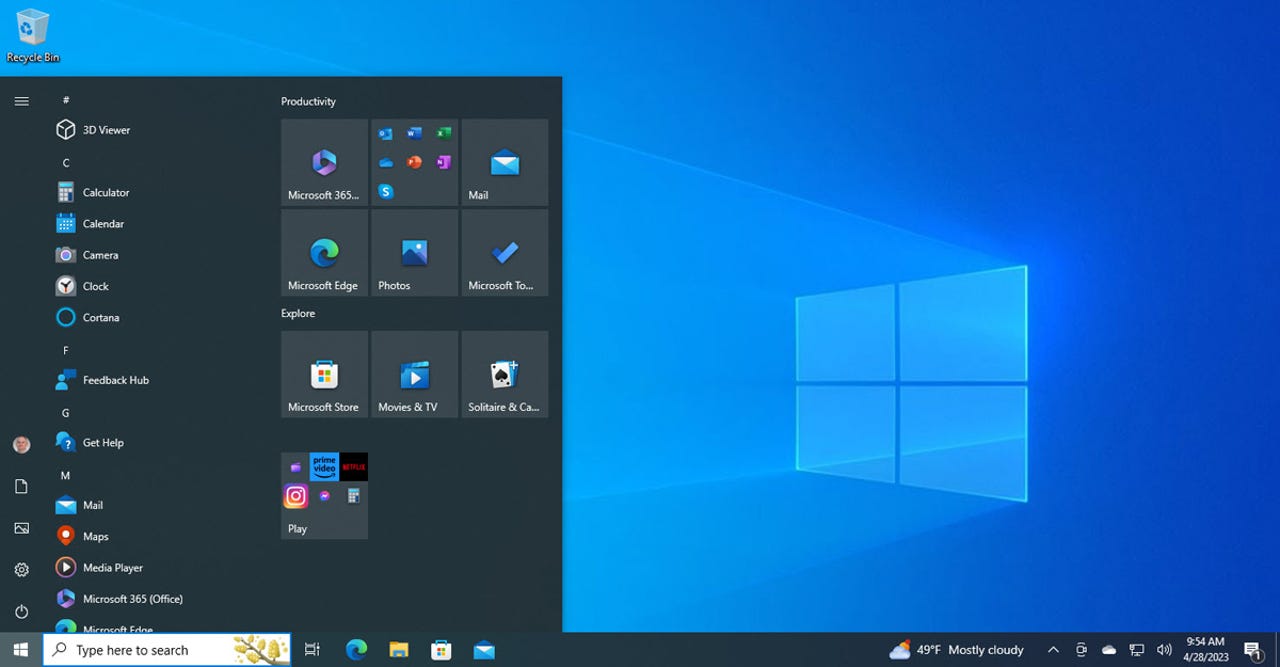































 screenshot by Lance Whitney/
screenshot by Lance Whitney/ In a move that signals the eventual end of Windows 10, Microsoft will not release any more new feature updates for its eight-year old operating system. In a Thursday blog post, Jason Leznek, principal product manager for Windows servicing and delivery, revealed that the current 22H2 version rolled out in 2022 will be the final one for Windows 10.
Also: How to replace your Windows 11 Start menu with a third-party app
Due to reach end of support on October 14, 2025, Windows 10 still has more than a couple of years of life left. Until that time, it will continue to receive the usual monthly updates to fix security holes and other issues. But once that deadline arrives, the OS will no longer be in line for security patches or technical help. Of course, you'll still be able to use it but just without the support and protection provided by Microsoft.
The 2021 feature update known as 21H2 is due to reach end of support on June 13, 2023. As such, Microsoft is urging anyone sticking with Windows 10 to upgrade to 22H2, which you can do by going to Settings, selecting Windows Update, and allowing the latest update to install. To double-check your version, head toSettings > System > About. The Windows specifications section will indicate your current version of Windows 10.
Also: Ready to ditch Windows for Linux? This is the ideal distro for you
The decision to nix future feature updates for Windows 10 is part of Microsoft's strategy to push more people to Windows 11, which lately has been grabbing the lion's share of new features and enhancements.
For example, the 22H2 update for Windows 11 brought with it a host of advancements, including Start menu folders, tabs in File Explorer, OneDrive integration, voice access, and the Clipchamp video editor. In contrast, the 22H2 update for Windows 10 brought virtually nothing new to the table aside from the nondescript "quality improvements."
Also: How to use Microsoft Edge's integrated Bing AI Image Creator
Despite its efforts to improve and enhance Windows 11, Microsoft still is facing resistance from people who want to remain with Windows 10. Windows 11 uptake has been slow since its debut in October of 2021. The latest data from StatCounter shows Windows 10 with a 73% slice of the market and Windows 11 with a 21% cut.
One problem is that the hardware and security requirements for Windows 11 are much stricter than those for Windows 10. Another issue is that Windows 11 changes certain core elements such as the Start menu and Taskbar, and not necessarily for the better. Of course, a third obstacle is that people are used to Windows 10, so why upgrade to something that's different and unfamiliar?
Also: The best Windows laptops you can buy
Will the move to halt feature updates for Windows 10 convince more people to jump ship to Windows 11? We'll see. However, rumors have been floating that Microsoft is prepping a Windows 12 for launch sometime in 2024. If those rumors prove true, then many people may hang onto Windows 10 for now and see what version 12 offers before deciding what to do.
 Etiquetas calientes:
tecnología
Servicios y Software
Etiquetas calientes:
tecnología
Servicios y Software